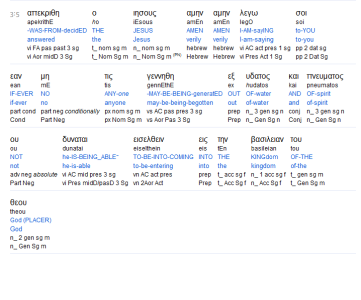Your post to me seems to be a copy and paste from someone else who did believe in baptismal regeneration, but your own confession said that you did not in your post to Behold.
I have no problem in copying and paste as long as you are in 100% agreement with them and that based upon thus saith the Lord. But you should carefully read what you copy and paste.
I don't believe in baptismal regeneration and proof read everything I post.
BAPTISM
I. Baptism in the Jewish life
A. Baptism was a common rite among Jews of the first and second century.
1. preparation for worship at the temple (i.e., cleansing rite)
2. the self baptism of proselytes
If someone from a Gentile background were to become a full child of Israel, he had to accomplish three tasks:
a. circumcision, if male
b. self-baptism by immersion, in the presence of three witnesses
c. sacrifice in the Temple
3. an act of purification (cf. Leviticus 15)
In sectarian groups of first century Palestine, such as the Essenes, baptism was apparently a common, repeated experience. However, to mainline Judaism, John’s baptism of repentance would have been humiliating for a natural child of Abraham to undergo a Gentile acceptance ritual.
B. Some OT precedents can be cited for ceremonial washing.
1. as a symbol of spiritual cleansing (cf. Isa. 1:16)
2. as a regular ritual performed by the priests (cf. Exodus 19:10; Leviticus 16)
It should be noted that all other baptisms in first century Jewish culture were self-administered. Only John the Baptist's call for baptism involved him as an evaluator (cf. Matt. 3:7-12) and administrator of this act of repentance (cf. Matt. 3:6).
II. Baptism in the Church
A. Theological Purposes
1. forgiveness of sin – Acts 2:38; 22:16
2. reception of Holy Spirit – Acts 2:38 (Acts 10:44-48)
3. union with Christ – Gal. 3:26-27
4. membership in church – 1 Cor. 12:13
5. symbol of a spiritual turning – 1 Pet. 3:20-21
6. symbol of a spiritual death and resurrection – Rom. 6:1-5
B. Baptism was the early church’s opportunity for a person’s public profession (or confession).
It was/is not the mechanism for salvation, but the occasion of the verbal affirmation of faith (i.e., probably, "Jesus is Lord"). Remember the early church had no buildings and met in homes or often in secret places because of persecution.
C. Many commentators have asserted that 1 Peter is a baptismal sermon. Although this is possible, it is not the only option. It is true that Peter often uses baptism as a crucial act of faith (cf. Acts 2:38,41;10:47). However, it was/is not a sacramental event, but a faith event, symbolizing death, burial, and resurrection as the believer identifies with Christ’s own experience (cf. Rom. 6:7-9; Col. 2:12).
The act is symbolic, not sacramental; the act is the occasion of profession, not the mechanism of salvation.
III. Baptism and Repentance in Acts 2:38
Curtis Vaughan, Acts has an interesting footnote on p. 28 related to Acts 2:38.
"The Greek word for ‘baptized’ is a third person imperative; the word for ‘repent,’ a second person imperative. This change from the more direct second person command to the less direct third person of ‘baptized’ implies that Peter’s basic primary demand is for repentance."
This follows the preaching emphasis of John the Baptist (cf. Matt. 3:2) and Jesus (cf. Matt. 4:17).
Repentance seems to be a spiritual key and baptism is an outward expression of this spiritual change. The New Testament knew nothing of unbaptized believers!
To the early church baptism was the public profession of faith. It is the occasion for the public confession of faith in Christ, not the mechanism for salvation! It needs to be remembered that baptism is not mentioned in Peter’s second sermon, though repentance is (cf. Acts 3:19; Luke 24:17). Baptism was an example set by Jesus (cf. Matt. 3:13-18). Baptism was commanded by Jesus (cf. Matt. 28:19).
The modern question of the necessity of baptism for salvation is not addressed in the New Testament; all believers are expected to be baptized. However, one must also guard against a sacramental mechanicalism! Salvation is a faith issue, not a right-place, right-words, right-ritual act issue!
Utley.
